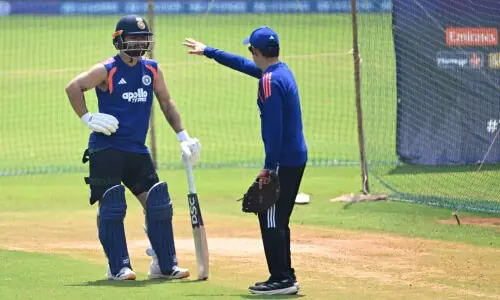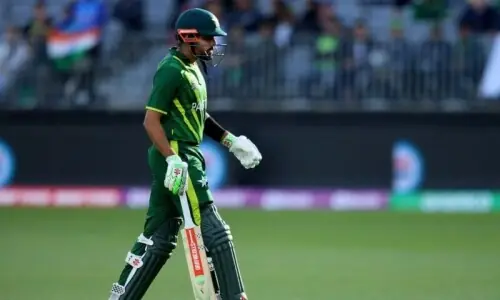In this third installment of our ‘Crazy Diamonds’ series, we continue our tributary look at those promising Pakistanis who experienced the flip side of genius – an awkward and often torturous state of being that some describe as being a kind of madness.
Previous Parts:
Crazy Diamonds - I Crazy Diamonds - II
__________________________________
Sagar Siddique
He migrated to Pakistan in 1947 (without his parents) and settled in Lahore.
The sensitive 19-year-old was excited by the prospect of becoming a citizen of a newly created country and at once got down to writing a national anthem for it.
Though he failed to get his version of the anthem accepted by the government and state of Pakistan, he moved on to publish a well-received literary magazine.
The magazine was a critical success but a commercial flop. Disappointed, Saghar shut down the magazine.
Unlike most Indian Muslims who had migrated to Pakistan, Saghar did not ask the government to settle him on the properties left behind by the Hindus and the Sikhs.
Instead he preferred to stay in cheap hotels. He paid his rent from the meagre amounts of money that he received from magazines for the poems he wrote for them.
Within a decade his early, youthful enthusiasm for Pakistan had eroded as he saw corruption, nepotism and mediocrity being rewarded at the expense of genuine talent and honesty.
Broke in more ways than one and at a stage where even the fast acting cheap whisky of Lahore failed to keep his crumbling self numb, Saghar discovered morphine.
He bought his daily dose from corrupt janitors of Lahore’s hospitals.
What’s more, when some poets used to find this thin, shaking addict outside their homes asking for money, they would give him a few rupees but only after he had written a poem or two for them.
These poets would then sell the poems to magazines for a lot more money and some even went to the extent of getting them published in their own names!
With both friends and strangers exploiting his genius of writing the most evocatively expressed Urdu ghazals to meet their own greedy needs; Saghar plunged even deeper into a state of despair.
Soon he was turned out by the cheap hotels he was living in and ended up walking the streets of Lahore.
A fan of his once wrote how (in 1966) while he was driving down Lahore’s Circuit Road, the radio in his car began to play a ghazal written by Saghar.
As the fan was quietly revelling in the power of Saghar’s words, his eyes caught a fleeting glimpse of a thin man with unkempt long hair and in tattered clothes walking aimlessly on the side of the road. It was Saghar.
As the world abandoned this genius, Saghar abandoned the world.
For years he could be seen walking and sleeping on the streets of Lahore, living on the food and money given to him by those who took him to be a beggar or a fakir.
Amazingly, he continued to write powerful poetry in spite of the fact that he could hardly utter a single coherent sentence when he did decide to open his mouth to speak.
At times he would write brilliant poems, read them out loudly with a void look in his eyes, then tear the papers he’d scribbled these poems on, make a heap and set the heap on fire.

After 15 years of morphine addiction, depression and living on the streets, in 1974 he was found dead on one such street of Lahore. Exposed to the cold winter of Lahore, he passed away in his sleep. He was just 46.
__________________________________
Professor Fazlur Rehman Malik
Maybe this is because for years the image of an Islamic scholar that has been peddled by the state and accepted by society in Pakistan is that of a man with a long beard, speaking Urdu in an Arabic accent (!), or a woman fully draped in a jet black burqa, mumbling moralistic little nothings on TV.
Professor Fazalur Rehman Malik was nothing of the sort. Clean-shaven, well-spoken, always looking sharp in Western suits and ties, and more importantly, extremely well-informed and well-versed in Islamic literature, philosophy and history, he was on the verge of almost completely undermining the role of religious parties in Pakistan when he was forced to flee the country.
After studying Arabic at the Punjab University in Lahore, Rehman went to Oxford University in the UK for further studies.
He was teaching Islamic philosophy at McGill University in Canada when in 1961 he got an invite from Pakistan’s head of state, Field Martial Ayub Khan, to come to Pakistan and help him set up the Central Institute of Islamic Research (CIIR).
Khan who had come into power on the back of a military coup in 1958, was not only allergic to civilian politicians (whom he described as being selfish and corrupt), but he also had a great dislike for religious parties and the clergy.
With the ambition to create a Pakistan driven by his ‘benevolent’ military dictatorship, and based on state-facilitated capitalism and a constitution culled from the ‘progressive and modernist Islam of Jinnah,’ Ayub wanted the CIIR to help him achieve this through legislation and the necessary laws.
It was the CIIR under Professor Rehman who advised Ayub to constitutionally curb the religious parties and their interpretation of Islam.
Rehman then drew a social and political framework for making Pakistan a ‘progressive, modern Muslim majority state.’
Though Ayub did not act upon each and every aspect of Rehman’s framework, the workings of the CIIR certainly made the Ayub regime become perhaps the most secular in the history of Pakistan.
However, Rehman was not a secularist. Instead he saw himself and his work to be a modern extension of the ‘Islamic rationalism’ of figures like Sir Syed Ahmad Khan, Syed Aamir Ali, Moulana Shibli Naoumani, Niaz Fathepuri and the 8th and 9th century Muslim rationalists, the Mu’tazilites.
The influential research papers that the CIIR produced under his guidance emphasised the application of reason in the interpretation of the Qu’ran, and the absorption of western science, philosophy and economics to help Islam survive as a progressive and flexible religion in the modern world.
However, when in one such paper he suggested that laws and society in Pakistan should be based on a rationalist and modernist interpretation of the Qu’ran, and that hadith (Islamic traditions based on hearsay), should only play a minimal role in this respect, he was vehemently challenged by his more conservative counterparts.
Leading the attack on him was the prolific Islamic scholar and founder of the fundamentalist Jamat-i-Islami (JI), Abul Ala Mauddudi, who demanded that Rehman be expelled from Pakistan.
Then, in 1967, during a lecture that he was delivering on Pakistan’s state-owned TV channel, PTV, Rehman suggested that drinking alcohol was a not a major sin in Islam and that alcoholic beverages with less than 5 per cent alcoholic content should not be considered unlawful.

Even though alcohol was legal in Pakistan till 1977, the religious parties went berserk and held a number of rallies against Rehman.
Rehman, more or less, was basically repeating what early scholars of the Hanafi School of Islamic jurisprudence had already suggested.
And ironically, some 40 years after Rehman’s musings and 30 years after the sale of alcohol (to Muslims) was banned in Pakistan, the highly conservative Federal Shariat Court of Pakistan finally decreed that consuming alcohol indeed was a minor sin.
In 1969 as Pakistan entered a turbulent period in which a far-reaching political movement led by leftist parties and
student organisations forced Ayub to resign, Rehman continued being perused and harassed by the Islamic parties until he was left with no other choice but to leave the country.
He went to the US and distinguished himself as a highly regarded Professor of Islamic Thought and researcher at the University of Chicago.
The 1970s and 1980s were also his most prolific years as an author in which he wrote some of the most influential books on modern Islamic thought (especially 1979’s ‘Islam’ and 1982’s ‘Islam & Modernity’).
He never returned to Pakistan and died in Chicago in 1988.
__________________________________
Agha Sikandar
As Pakistan’s misadventure in the anti-Soviet Islamist insurgency in Afghanistan brought in even more heroin and guns from across an anarchic Afghan-Pakistan border, the drug began to attract the attention of young middle-class Pakistanis as well.
It broke families and even took lives, and a time came when its easy availability also drew in quite a few TV and film artistes into its deadly allure.
Young Agha Sikandar was one such TV actor. He was an educated young man in Lahore with a dream to make a name for himself as a respected film personality.
His early talent and good looks helped him bag a few small roles in TV plays in the late 1970s.
Emotionally fragile and romantic in disposition, Agha excelled in his first major role in which he played an emotionally vulnerable son of a widow in 1979’s Waris – a TV serial that tackled the growing tensions in Pakistan between rural traditions and urban modernity.
Waris was a massive hit. Sikandar followed it up with another brilliant performance in Ashfaq Ahmad’s philosophical (and at times satirical) ‘Cinderella aur Sakina’ in 1981, and soon he was being showered with offers from filmmakers.
Directors saw him to be a naturally romantic hero, but unfortunately by the early 1980s Urdu cinema in Pakistan was in decline and being replaced by the rise of violent and loud Punjabi films.
But Sikandar did manage to experience at least one big success in film. The 1982 comedy, Mian Biwi Razi, turned out to be a box-office hit and in which Sikandar played a comic role alongside such Urdu film veterans as Sangeeta, Kavita and Nadeem.

When he returned to the mini-screen in 1983, Sikandar was already an established TV and (for a while) film star.
But after 1985 his output on both the mediums began to decline.
Like so many young Pakistanis, Sikandar too had stumbled upon heroin. His addiction to the drug had made him unpredictable and even more emotionally fragile than he already was.
He was in and out of rehabilitation centres on numerous occasions but every time he tried to rekindle the fame he had tasted between 1979 and 1983, he couldn’t find any takers.
By the early 1990s he completely disappeared from the scene. Emotionally battered, haunted (and taunted) by his addiction and failing to come to terms with the loss of fame and friends, Agha’s name finally reappeared once again in 1993.
But this time it was spoken only to announce the former star’s untimely death.
He was only 40 and according to his contemporaries he had utilised only a small portion of the talent he was blessed with.
__________________________________
Shoaib Akhtar
It was his bad luck that when he became a regular member of the Pakistan squad, the culture of the Pakistan cricket team had begun to change radically.
Akhtar did manage to rise as one of world cricket’s fastest bowlers and a bonafide star, but during the period when it was expected of him to peak, he found himself under the captainship of Inzamam-ul-Haq.
Haq’s batting style was almost an exact opposite of his personality. A dashing, immensely talented batsman, Haq as a person was first laid-back and then, after he joined the Islamic evangelical outfit the Tableeghi Jamat (TJ), he became critical of players whom he thought were not conforming to the ‘religious zeal’ he had injected in the team.
Haq was convinced that this was the perfect way to keep the squad disciplined and away from controversies.
Shoaib became the most prominent victim of Inzi’s religious dabbling. He constantly squabbled with Inzi, calling him a hypocrite for dragging religion into sport.
During the start of his career in the late 1990s, Shoaib had seen the last vistas of the team’s old culture in which the players combined their cricketing skills with a love of visiting nightclubs, drinking and having fleeting affairs.
By the mid-2000s, Inzamam, convinced that discipline in the squad can only be achieved by imposing a strict religious regime, put a stop to this.
Akhtar, however, refused to give up late night partying, saying that it was his personal matter.

Shoaib believed that most players were just ‘pretending to be religious’ because they wanted to remain in the good books of skipper, Inzamam.
Inzi rubbished the accusations reminding that his top spinner, Danish Kaneria, was a Hindu.
Inzimam also felt disappointed when former Pakistan captain and cricket icon, Imran Khan, critisised Inzamam for ‘mishandling Shoaib.’ Khan said that he had dealt more unpredictable and rebellious players than Shoaib in his side, namely Sarfraz Nawaz and Wasim Raja.
Some players pointed at Shoaib’s past for his ‘rebellious behaviour.’ It is said that Akhtar grew up as a ‘hooligan’ in his hometown (Rawalpindi) and had gotten into numerous fist and knives fights at school and college.
Whatever the case, Shoaib remained an outsider in Inzamam’s team, and Inzi’s tableeghi contingent that became a regular fixture in the dressing room, avoided him like the plague.
‘They found him to be mocking and rude, and stayed clear of him,’ wrote one cricket writer, Osman Samiuddin.
Fighting the team’s new culture, his isolation and his vulnerability to regularly break down and lose match fitness, Akhtar failed to get the number of wickets he was first expected to bag.
In a career spanning over 10 years, Akhtar played only 46 Tests and 163 ODIs.
Though he bowled the fastest delivery ever recorded in cricket history (100.2 mph), and almost single-handedly won a number of games with his fearsome pace, throughout his career he was plagued by controversy, bans, bust-ups and criticism.
Alienated by Inzi and the team’s overt religious fervour, Shoaib stumbled from one controversy to another, unable to fulfil the early expectations his fearsome bowling had promised.
Over the years his critics have believed that he was too unpredictable, quarrelsome and injury-prone — not to forget having a history studded with reports about a number of indulgences involving both medical and recreational substances.
However, what got missed in all the racket about Akhtar’s eccentricities was something ironic: Despite his bad boy image or of someone who would not submit to the dictates of the team’s puritanical new culture, never once did his name come up in the many match and spot-fixing episodes that the Pakistan cricket team has found itself in over the last many years.
In this respect he remained absolutely unstained and clean.
In his autobiography that was published after he retired from the game in 2011, Shoaib lamented his self-destructive personality and also the way he was mishandled by his captains.
He wrote that had he played under former Pakistani captains like Imran Khan or Mushtaq Muhammad, he would have achieved a lot more as a bowler.
But that was not to be and Akhtar retired from the game only partially doing justice to what his talents had initially promised.
__________________________________
Sara Shagufta
Though many do know about one Sara Shagufta as well, somehow a lot of local literary critics feel a sense of dread, confusion and even frustration while critiquing her poetry and personality.
Sara’s work has attracted polemical and highly polarised responses. Some have gone on to call her the Virginia Woolf of Pakistan while others have scorned at her for being a self-obsessed rambler.
One of the reasons behind the contrasting responses that her work has provoked is perhaps to do with how she suddenly exploded as a poet after living a pretty ordinary bourgeoisie life of a housewife.
Sara Shagufta was born in Gujranwala in 1955. She wrote poetry only fleetingly as a teenager, going through the motions of schooling and willingly being prepared by her parents to one day become a good housewife.
What was unknown to her parents, and maybe even to her, was the fact that her obedience was an unconscious attempt on her part to severely repress a rather volcanic emotional side to her personality that would finally come bursting out much later.
When she first got married in 1972 at the age of 17 she tried her best to become the ‘good wife.’ But her insightful personality and intelligence somehow offended her husband. The marriage didn’t last and she moved on to marry a second time, this time on her own accord.
But when the couple’s child died at birth, the husband (albeit silently) blamed Sara.
This is the moment where what she had been repressing for years finally erupted.
It was a rebirth of sorts but an extremely painful one. The emotional volcano in her had been simmering for far too long. She stormed out of the marriage and began to use the lava that poured out as ink with which she began to write some of the most controversial and intense poetry.
For the next decade or so she would write manic, provocative and yet overtly sensitive poems and looking for a man who would sacrifice his ego to empathise with her now stirred state of mind and sense of love.
She rapidly fell in and out of love, marrying twice more but storming out of these marriages as well.
When the reactionary military man, General Ziaul Haq, toppled the Z A. Bhutto regime in July 1977, Sara turned political.
Though her poems were still mostly about misunderstood women and a longing to be loved and understood despite her turbulent emotional state and individualism, she plunged into political activism, taking part in various anti-Zia rallies and movements.

In the early 1980s she was arrested at a time when the military regime was jailing opponents, torturing poets, student activists and intellectuals and publicly flogging journalists.
Many chose to escape into exile, but Shagufta decided to stay. However, as Zia continued to strengthen his grip on power, and Shagufta’s fourth marriage too crumbled, pressed to the brink by her ongoing emotional, intellectual and now political tribulations, she finally ran out of the emotional and intellectual corners that she had constructed for herself to retreat back into.
Then on the night of March 1984, she committed suicide by swallowing poison. She was only 29.
__________________________________
Abdul Rashid Ghazi
Ghazi today is remembered as a radical Muslim cleric of Islamabad’s Lal Masjid (Red Mosque) and a jihadist who had asked his followers to burn down CD shops and kidnap ‘obscene women’ in Islamabad.
After refusing to give in to the restraining orders by the government of General Parvez Musharraf, the mosque and its madressa were stormed by the army and Ghazi was shot dead.
There are two prevailing views about Ghazi. The first one describes him as a terrorist and a brute who wanted to impose his version of the Sharia by force, while the other hails him as a ‘mujahid’ who stood up to the might of an ‘infidel state.’
But the person I met in Islamabad (Ghazi’s friend) had a third view. He said that Ghazi was all this for a very brief period of his life. In reality, he was an extremely bright man with an equally bright future.
‘He could have been a brilliant diplomat in the foreign office and maybe even an ambassador or a great educationist,’ his fried told me.
Actually a diplomat at the United Nations (UN) is what Ghazi was planning to become when he joined college in 1982.
Born in a highly conservative family, Rashid’s father was a cleric who had founded the Red Mosque in the late 1960s.
The father wanted his two sons to follow in his footsteps and for this he enrolled them in a madressa. Ghazi rebelled and quit the madressa, demanding that he be put in a ‘normal school.’
His father reluctantly got him admitted in an all-boys school from where Ghazi did his matriculation in 1979.
A lover of music, films and political histories, Ghazi also began dreaming of becoming a diplomat or an ambassador.
He once again got into an altercation with his father when he refused to keep a beard and then joined a co-ed college where he got involved with various anti-Zia student groups.
He was not on talking terms with his father after graduating with flying colours from college. In 1984 he joined the Quaid-i-Azam University that was then a hotbed of anti-Zia activities.
He enrolled as an MSc student of International Relations. His friends remember him to be a brilliant student and an active member of a progressive student group.
This created a problem for his father who was being facilitated by the Ziaul dictatorship to help him produce jihadists for the anti-Soviet Afghan insurgency that Pakistan was backing.
‘He hardly ever went to a mosque, let alone visiting his father’s mosque,’ his friend claimed. ‘He was reading writings by Marx, Max Weber and Henry Kissinger rather than what was being produced by his father. He was lively, always looking to have fun, dressed in fine T-Shirts and denims, but always focused on becoming an international figure in world diplomacy,’ the friend added.
Ghazi’s brother who had followed his father into becoming a cleric would never miss the opportunity to admonish Ghazi for going against family traditions and bringing a bad name to their father due to his ‘westernised’ ideas and lifestyle.
‘But Ghazi never took him seriously,’ the friend informed me.
So what happened then?
According to Ghazi’s friend, two things triggered Ghazi’s radical transformation.
After getting his Masters degree in International Relations, Ghazi ended up getting a job at the Ministry of Education.
‘He was so bright and intellectually engaging that we all thought he’d be on his way to the UN right after university,’ his friend smiled. ‘But these sorts of things take time and Abdul was impatient.’
Estranged from his family and not achieving his goal fast enough, Ghazi became agitated. Then when his father was assassinated in 1998 (by a rival Jihadi group), Ghazi fell into despair.
‘All that guilt that had been put into him by his brother came to the forefront,’ his friend explained. ‘His brother told him how he had hurt his father’s feelings …’
Ghazi went into depression after his father’s murder and began attending gatherings of a variety of Islamic evangelical groups.
Then, in 1999, he joined his brother at the Red Mosque where both became leaders.
After Pakistan entered the ‘War on Terror’ as a US ally, the brothers established links with militant organisations, including the al Qaeda.
Before his violent death, Ghazi was a changed man. He’d grown a beard, renounced his ‘secular’ past and became a vehement Islamist.
But his friend rightly added: ‘He wasn’t built to fight. He was too intelligent to become a jihadi. His philosophy might have become aggressive, but I don’t think he was willing to die for it.’
This statement kind of bodes with what some TV channels began to report when the military operation was going on against Rashid and his colleagues.
These reports suggested that Rashid was willing to surrender, but was held hostage (through ‘emotional blackmail’) by some front line jihadists in his group until the military finally barged in and shot dead each one of them.
This man who had dreamt and studied to be an international diplomat died for a thought he had actually rejected for most of his life. He was 41.
__________________________________

The views expressed by this blogger and in the following reader comments do not necessarily reflect the views and policies of the Dawn Media Group.































